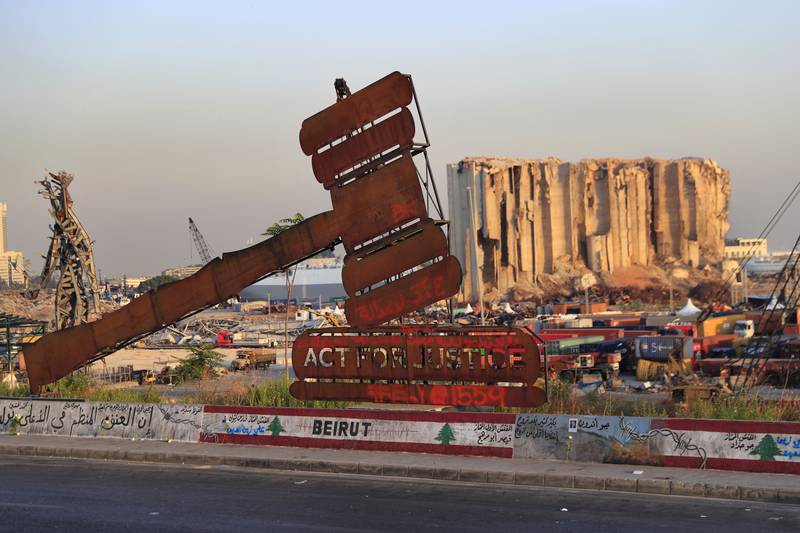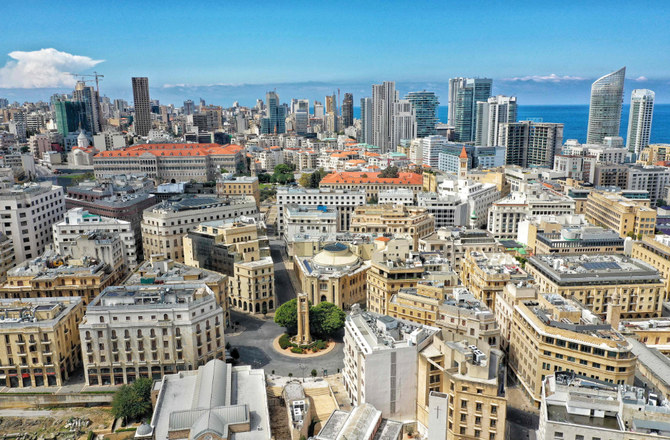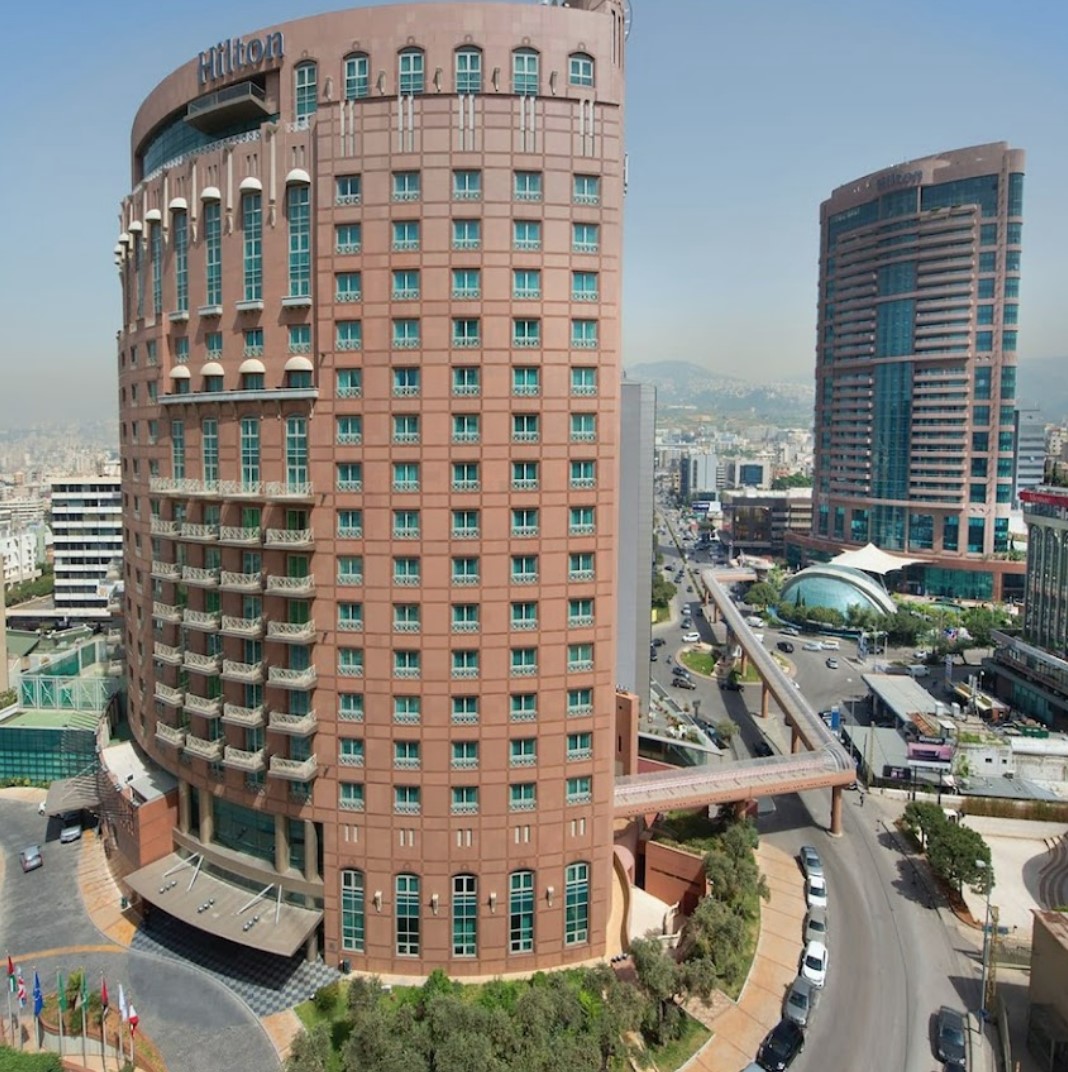
By Anna Foster & David Gritten BBC News, Beirut & London -- Lebanon's top prosecutor has charged the judge leading the inquiry into the 2020 Beirut port blast and ordered the release of suspects in custody. Ghassan Oweidat summoned Judge Tarek Bitar for questioning, accusing him of "acting without a mandate". But the judge insisted that Mr Oweidat had no authority to charge him.
On Monday, he unexpectedly restarted the probe after a 13-month suspension and filed unspecified charges against eight officials, including Mr Oweidat. No-one has yet been held accountable for the blast on 4 August 2020, which killed at least 218 people and injured more than 6,000 others. A fire triggered the detonation of 2,750 tonnes of ammonium nitrate that had been stored unsafely in a port warehouse for almost six years, causing a massive explosion that devastated a large part of the Lebanese capital. It is widely believed that officials and politicians were aware of the combustible chemical's existence and the danger it posed but that they failed to secure, remove or destroy it. Victims' relatives and activists say the investigation into the disaster is being hampered by the Lebanese political leadership's efforts to shield those responsible from scrutiny.
The power struggle at the highest levels of the Lebanese judiciary burst into the open on Wednesday when the public prosecutor dramatically announced that all of the 17 suspects being held in pre-trial detention could go free. Mr Oweidat also accused Judge Bitar of acting beyond his jurisdiction and imposed a travel ban on him. He told AFP news agency that the judge was "rebelling against the judiciary and usurping power", and that he had filed charges in order to "prevent sedition". But Judge Bitar vowed to continue his investigation "until the indictment is issued", Lebanon's state-run National News Agency cited him as saying. He declared that Mr Oweidat's decisions were "illegitimate and should not be implemented", noting that the prosecutor was "a defendant, and as such he cannot take any decision in this case". Mr Oweidat had previously recused himself from matters concerning the investigation after his brother-in-law, former public works minister Ghazi Zaiter, was charged.

by Lachmi Deb Roy -- .firstpost.comA poetic blend of the personal and the political scene, Skies of Lebanon combines live action with animation to create a vivid picture of Lebanon, inspired by the family history of the director Chloé Mazlo. By using stories told to her by her grandmother about life during the Lebanese civil war, Mazlo crafts a touching and heart-breaking story of love during the conflict. In an exclusive interview to Firstpost, Chloé Mazlo says that she loves India though it is her first visit. “I wish to come back again.” Skies of Labanon is her first feature film. When it comes to portraying a story that is so close to her heart and has been waiting to be told, it is a story she heard from her grandmother. It is a story of love set in Lebanon during the 1950s, amidst a civil war. Above all, she was driven to make the film by the urge to tell this story. “My grandmother was born in Switzerland, but she didn’t like the life there. Moving to Lebanon, she fell in love with the place and its culture. She felt that she was born for the second time. She simply loved the people, the food and the close knit family culture of Lebanon. And for me it’s a letter of love for the country.”
The film was selected for the Semaine de la Critique at the 2020 Cannes Film Festival. Talking about her film, Chloé Mazlo’s says, “Skies of Lebanon (Sous le ciel d’Alice) is a story of love between Switzerland and Lebanese people. It’s is the story of young Alice who leaves Switzerland for Lebanon, a sunny and exuberant country, where she falls in love with Joseph, an astrophysicist who dreams of sending the first Lebanese into space.” Chloé Mazlo was born in Paris, but she grew up hearing stories on Lebanon. “Hearing to the stories for me Lebanon became like a paradise on earth.” Mazlo was so drawn to the story of Skies of Lebanon that she did not regret the flaws that crept in while making the film. “With Skies of Lebanon, I wanted to tell the stories of my family, using the tone they had when they talked about the war. I couldn’t find this tone in the other films that I saw about the particular subject. I grew up fascinated by this country and despite the civil war, my family still feels it’s a beautiful country.”

By Nada Maucourant Atallah -- thenationalnews.com -- Imagine ordering a coffee for one price, then three hours later being charged more for the same hot drink. You'd think it was a scam but it's an unfortunate reality for Lebanese living through an unprecedented currency crisis. A customer at Goro, a restaurant in Beirut's Gemmayzeh neighbourhood, experienced precisely this feeling while visiting one of the popular haunts of Beirut nightlife and dining. Within three hours, the price of his coffee jumped by 9 000 Lebanese pounds, the equivalent of $0.18 on the parallel market, where the national currency topped the symbolic 50,000 mark on Thursday, the first time such an unwelcome milestone has been reached. "Ordered my first coffee at 10.30am, the second one at 1pm. The Lebanese Lira lost value during that time, resulting in two different charges", he wrote in a tweet on Friday, widely shared on social media. The sudden increase is due to the restaurant pricing its menu in dollars.
Customers can pay the bill in dollars or in the local currency, but at the parallel market rate, which remains highly volatile and can undergo sudden changes in mere hours. Once pegged at 1,500 against the US currency, the Lebanese pound has now lost 97 per cent of its value since the start of the crisis caused by a drastic shortage of dollars, which plunged 80 per cent of the population into poverty and led the country to the verge of financial collapse. More and more restaurants have switched to the dollar instead of the Lebanese pound, which is gradually disappearing from menus. Restaurateurs say they have no choice. "Because of the volatility of the Lebanese pound, our suppliers are only accepting dollars," said Kamal Darwich, a manager at Onno in Beirut. He said the price increases also covered rocketing expenses such as gas and electricity, as restaurants have to rely on expensive private generator suppliers in the near absence of state electricity. Salaries, however, are not entirely in dollars but are paid as a mix of both currencies.

(by Malek el Khazen) Disclaimer: (My opinions are my own) -
The “general” in artificial general intelligence is not characterized by the number of different problems it can solve, but by the ability to solve many types of problems. A general intelligence agent must be able to autonomously formulate its own representations. It has to invent its own approach to solving problems, selecting its own goals, representations, methods, and so on. To create truly intelligent systems, we need to move beyond data and model-centric approaches, and instead build systems that can mimic the brain's processing of information to understand the 'real world.
Current Approaches that are being used to Create an AI models:
The first is to create an AI that is able to understand and learn like a child by using reinforcement learning. However, this method has its limitations, as it is difficult to create a rich environment for the AI to learn. In many cases, you cannot use rewards as an efficient way of learning. For example, a human can clearly communicate the abstract meaning of an article vs through Reinforcement learning this becomes much more complex.
Another popular idea for creating Artificial General Intelligence (AGI) is to continue to scale deep learning. Bigger neural networks will eventually crack the code of general intelligence. And the evidence shows that adding more layers and parameters to neural networks yields incremental improvements, especially in language models such as GPT-3.
· Nevertheless, critics such as PyTorch Tabular creator Manu Joseph was quoted during a conference: “The lack of high-quality test data and a majority of the internet content are duplicates make it difficult to gather enough data for LLM training.” Additionally, the fact that meta's Galactica LLM was trained based exclusively on scientific research makes its output even worse. This resulted in the public demo being discontinued within three days.
Khazen History


Historical Feature:
Churches and Monasteries of the Khazen family

St. Anthony of Padua Church in Ballouneh
Mar Abda Church in Bakaatit Kanaan
Saint Michael Church in Bkaatouta
Saint Therese Church in Qolayaat
Saint Simeon Stylites (مار سمعان العامودي) Church In Ajaltoun
Virgin Mary Church (سيدة المعونات) in Sheilé
Assumption of Mary Church in Ballouneh
1 - The sword of the Maronite Prince
2 - LES KHAZEN CONSULS DE FRANCE
3 - LES MARONITES & LES KHAZEN
4 - LES MAAN & LES KHAZEN
5 - ORIGINE DE LA FAMILLE
Population Movements to Keserwan - The Khazens and The Maans
ما جاء عن الثورة في المقاطعة الكسروانية
ثورة أهالي كسروان على المشايخ الخوازنة وأسبابها
Origins of the "Prince of Maronite" Title
Growing diversity: the Khazin sheiks and the clergy in the first decades of the 18th century
Historical Members:
Barbar Beik El Khazen [English]
Patriach Toubia Kaiss El Khazen(Biography & Life Part1 Part2) (Arabic)
Patriach Youssef Dargham El Khazen (Cont'd)
Cheikh Bishara Jafal El Khazen
Patriarch Youssef Raji El Khazen
The Martyrs Cheikh Philippe & Cheikh Farid El Khazen
Cheikh Nawfal El Khazen (Consul De France)
Cheikh Hossun El Khazen (Consul De France)
Cheikh Abou-Nawfal El Khazen (Consul De France)
Cheikh Francis Abee Nader & his son Yousef
Cheikh Abou-Kanso El Khazen (Consul De France)
Cheikh Abou Nader El Khazen
Cheikh Chafic El Khazen
Cheikh Keserwan El Khazen
Cheikh Serhal El Khazen [English]
Cheikh Rafiq El Khazen [English]
Cheikh Hanna El Khazen
Cheikha Arzi El Khazen
Marie El Khazen